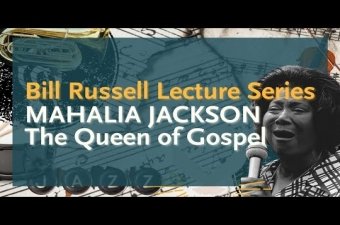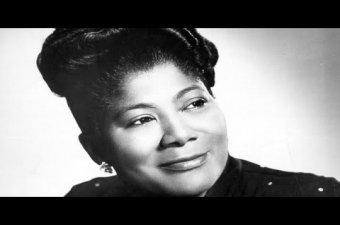Mount Moriah Baptist Church
147 Millaudon St.New Orleans LA 70118
Mount Moriah Baptist Church was the focal point of Mahalia Jackson’s social, spiritual, and musical life from early childhood through her teens, and an enduring influence in her rise as the the “Queen of Gospel Music.”
Jackson’s grandfather, Paul Clark, who was born into slavery on a plantation northwest of Baton Rouge, preached at Mount Moriah starting in the 1910s. The church was a few blocks from the house where Jackson was born in 1911 and the one where she grew up, near the Mississippi River levee in the Uptown neighborhood now called the Black Pearl.
Though she was christened at nearby Plymouth Rock Baptist Church, Jackson settled in at Mount Moriah at a young age, and distinguished herself in its youth choir.
Jackson’s father was absentee and her mother died when she was six, so she was raised by her Aunt Duke, a harsh disciplinarian. She let Jackson out of the house only for church, school, and work–the family was poor, and Jackson had to suspend her studies in fourth grade to help support herself (she sometimes had to go to church services barefoot).
Fortunately, Mount Moriah included a community center where children could attend fish fries, movie screenings, and gatherings where secular music was permitted—Jackson wowed her peers by singing hits by her favorite artist, Bessie Smith, the “Empress of the Blues.”
At 14 Jackson was baptized in the river shallows as a member of Mount Moriah. By then she’d graduated to the church’s adult choir. She recalled:
I loved best to sing in the congregation of our church….All around me I could hear the foot-tapping and hand-clapping. That gave me bounce. I liked it much better than being up in the choir singing the anthem. I liked to sing the songs which testify to the glory of the Lord—those anthems are too dead and cold for me. As David said in the Bible—‘Make a joyous noise unto the Lord!’—that’s me.
As biographer Mark Burford notes, the “Dr. Watts” style of congregational singing heard at Mount Moriah informed Jackson’s practice of drawing out vocal lines slowly, with improvised embellishments. But it was the rhythmic “bounce,” the foot-tapping and hand-clapping that accompanied music in Mount Moriah and all over the neighborhood, that became Jackson’s calling card, and, in her estimation, one of her contributions to the evolution of gospel music in general.
She brought this emotive, “jazzy” style to Chicago when she moved there, either in 1927, as is commonly held, or in 1931, as Burford argues. From the circuit of Black churches in the area she moved to the recording studio, radio, television, and concert stages around the world.
By the mid-1950s she was a star, and her humble upbringing along the levee in New Orleans was part of her persona. Emphasizing the importance of her roots, she arranged for a live national television broadcast of service at Mount Moriah the Sunday before Christmas in 1956, and sang with her old choir. The director called for decorum in the congregation, Jackson’s cousin Celie Taylor told biographer Laurraine Goreau, but “the spirit got high!…We forgot all about the instruction ‘Be quiet.’ That was done away with, honey.”
As she became an international celebrity, Jackson continually declined lucrative offers to record secular music and perform in popular venues (when she appeared at Madison Square Garden, she convinced management to suspend the sale of alcohol for the night). This was one more element of her upbringing in Mount Moriah that never left her: she considered singing to be a devotional act. Her performances were an extension of her faith, meant not merely to entertain but to inspire.
To wit: Jackson forged a close relationship with Rev. Dr. Martin Luther King, Jr., and became a prominent figure in the civil rights movement, singing at rallies and fundraisers across the country. In 1967, a civil rights activist and co-founder of the Southern Christian Leadership Conference with King, Rev. Dr. Simmie Lee Harvey, became a pastor at Mount Moriah, reinforcing the bond between the church and Jackson’s work.
When Jackson died in 1972, Harvey was one of the officiants at her funeral in New Orleans. On its way to Providence Park Cemetery, the procession of twenty-four limousines drove past Mount Moriah, which played her records on loudspeakers audible on the street.
For decades, the church held an annual parade in the Black Pearl, which Dr. Michael White, the clarinetist, composer, and historian, recalled playing in the late 1970s with Doc Paulin’s Brass Band:
Playing in that event always conjured up a special feeling of an earlier time in the rural-like neighborhood — a time that Mahalia had recalled, when the exciting music of parading brass bands and early jazz inspired and influenced her singing.
While the parade has tapered off, the church is still active today, and celebrates its sesquicentennial in 2024.
Videos

In "Mahalia Jackson: The Queen of Gospel Music" Dr. Mark Burford, Dr. Valerie Francis, and vocalist Andaiye Alimayu present lecture and music to celebrate Jackson’s extraordinary life and career.
Video by The Historic New Orleans Collection.
In "Mahalia Jackson: The Queen of Gospel Music" Dr. Mark Burford, Dr. Valerie Francis, and vocalist Andaiye Alimayu present lecture and music to celebrate Jackson’s extraordinary life and career.

"Mahalia Jackson: The Power and the Glory" documentary directed by Jeff Scheftel
Video posted by Kayla Williams.
"Mahalia Jackson: The Power and the Glory" documentary directed by Jeff Scheftel
Images















